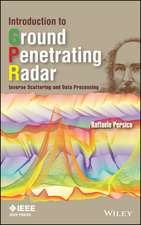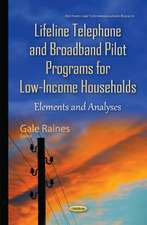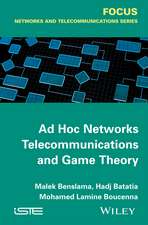Contributions to Simulation Speed-Up: Rare Event Simulation and Short-Term Dynamic Simulation for Mobile Network Planning: Advanced Studies Mobile Research Center Bremen
Autor Eugen Lamersen Limba Engleză Paperback – 12 iun 2008
Din seria Advanced Studies Mobile Research Center Bremen
-
 Preț: 383.93 lei
Preț: 383.93 lei - 20%
 Preț: 413.47 lei
Preț: 413.47 lei - 20%
 Preț: 642.33 lei
Preț: 642.33 lei - 20%
 Preț: 530.95 lei
Preț: 530.95 lei - 20%
 Preț: 639.85 lei
Preț: 639.85 lei - 15%
 Preț: 640.55 lei
Preț: 640.55 lei - 20%
 Preț: 639.20 lei
Preț: 639.20 lei -
 Preț: 380.45 lei
Preț: 380.45 lei - 20%
 Preț: 302.13 lei
Preț: 302.13 lei - 20%
 Preț: 326.46 lei
Preț: 326.46 lei - 20%
 Preț: 330.42 lei
Preț: 330.42 lei - 20%
 Preț: 327.29 lei
Preț: 327.29 lei - 20%
 Preț: 328.27 lei
Preț: 328.27 lei - 20%
 Preț: 330.10 lei
Preț: 330.10 lei - 20%
 Preț: 498.53 lei
Preț: 498.53 lei
Preț: 633.02 lei
Preț vechi: 744.73 lei
-15% Nou
Puncte Express: 950
Preț estimativ în valută:
121.13€ • 126.89$ • 100.39£
121.13€ • 126.89$ • 100.39£
Carte tipărită la comandă
Livrare economică 08-22 aprilie
Preluare comenzi: 021 569.72.76
Specificații
ISBN-13: 9783834805249
ISBN-10: 3834805246
Pagini: 172
Ilustrații: XXI, 148 p.
Dimensiuni: 148 x 210 x 10 mm
Greutate: 0.21 kg
Ediția:2008
Editura: Vieweg+Teubner Verlag
Colecția Vieweg+Teubner Verlag
Seria Advanced Studies Mobile Research Center Bremen
Locul publicării:Wiesbaden, Germany
ISBN-10: 3834805246
Pagini: 172
Ilustrații: XXI, 148 p.
Dimensiuni: 148 x 210 x 10 mm
Greutate: 0.21 kg
Ediția:2008
Editura: Vieweg+Teubner Verlag
Colecția Vieweg+Teubner Verlag
Seria Advanced Studies Mobile Research Center Bremen
Locul publicării:Wiesbaden, Germany
Public țintă
ResearchCuprins
Statistical Accuracy.- Simulation Speed-up with RESTART.- Distributed RESTART.- Short-Term Dynamic Simulation Concept.- STD Simulation of UMTS Models.- Conclusions.
Notă biografică
Dr. Eugen Lamers works on quality assurance in the field of automation.
Textul de pe ultima copertă
For the simulation of stochastic systems, those techniques are essential which are able to speed up the simulation, i.e. the equivalent of increasing the accuracy that can be reached within a given run-time, especially with a focus on rare events.
Eugen Lamers explains the principle of simulation speed-up in general, demonstrates the technique RESTART for the simulation of rare events, and addresses its efficiency on distributed systems. Due to the character of RESTART, the efficiency is limited by the high communication overhead. The author introduces the Short-Term Dynamic Simulation concept, developed for the planning of mobile radio networks, which enables fast state space coverage along with the consideration of dynamic aspects. He analyses the speed-up potential on a theoretical basis with analytically solvable Markov models for different utilisations. With realistic models for UMTS network planning he shows that the evaluation of dynamic performance measures benefits from the Short-Term Dynamic Simulation technique.
Eugen Lamers explains the principle of simulation speed-up in general, demonstrates the technique RESTART for the simulation of rare events, and addresses its efficiency on distributed systems. Due to the character of RESTART, the efficiency is limited by the high communication overhead. The author introduces the Short-Term Dynamic Simulation concept, developed for the planning of mobile radio networks, which enables fast state space coverage along with the consideration of dynamic aspects. He analyses the speed-up potential on a theoretical basis with analytically solvable Markov models for different utilisations. With realistic models for UMTS network planning he shows that the evaluation of dynamic performance measures benefits from the Short-Term Dynamic Simulation technique.













